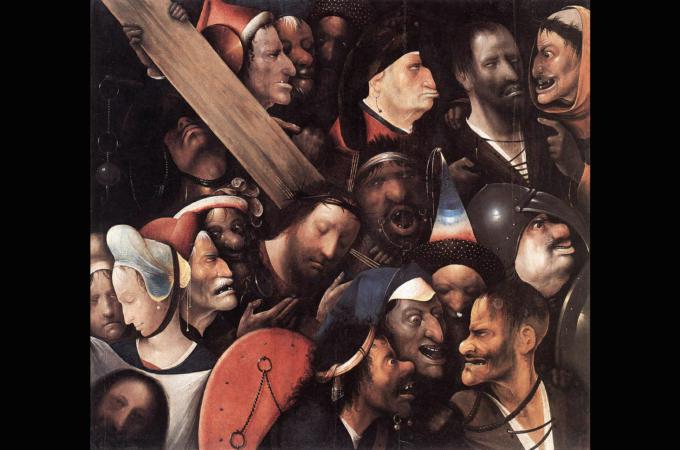Sensitivity and Suffering
Daniel Berrigan, in one of his famous quips, once wrote: Before you get serious about Jesus, first consider carefully how good you are going to look on wood!
In saying this, he was trying to highlight something that's often radically misunderstood from almost every side, namely, how and why authentic religion brings suffering into our lives.
On the one hand, all too common is the idea that if you welcome God into your life you will have an easier walk through life; God will spare you from many of the illnesses and sufferings that afflict others. Conversely, many others nurse the feeling, if not explicit belief, that God means for us to suffer, that there's an intrinsic connection between suffering and depth, and that the more painful something is the better it is for you spiritually. There is, of course, some deep truth in this, spiritual depth is inextricably connected to suffering, as the Cross of Jesus reveals; and scripture does say that God chastises those who draw close to Him. But there are countless ways to misunderstand this.
Jesus did say that we must take up our cross daily and follow him and that following him means precisely accepting a special suffering. But we might ask: Why? Why should suffering enter into our lives more deeply because we take Jesus seriously? Shouldn't the opposite be true? Does true religion somehow stand against our natural exuberance? Is suffering deep and joy superficial? And, what does this say about God? Is God masochistic? Does God want and demand our suffering? Why is a certain inflow of pain necessarily concomitant with taking God seriously?
Pain will flow into us more deeply when we take God seriously not because God wants it or because pain is somehow more blessed than joy. None of these. Suffering and pain are not what God wants; they're negatives, to be eliminated in heaven. But, to the extent that we take God seriously, they will flow more deeply into our lives because in a deeper opening to God we will stop falsely protecting ourselves against pain and become much more sensitive so that life can flow more freely and more deeply into us. In that sensitivity, we will stop unconsciously manipulating everything so as to keep ourselves secure and pain-free. Simply put, we will experience deeper pain in our lives because, being more sensitive, we will be experiencing everything more deeply.
The opposite is also true. If someone, as a crass expression might put it, is so insensitive so as to be thick as plank, his own insensitivity will surely immunize him against many sufferings and the pain of others will rarely disturb his peace of mind. Of course, he won't experience meaning and joy very deeply either, that's the price tag for insensitivity.
A number of years ago, Michael Buckley, the California Jesuit, preached at the first mass of a newly ordained priest. In his homily, he didn't ask the newly ordained man if he was strong enough to be a priest, but rather if he was weak enough to be a priest. In teasing out what's contained in that paradox, Buckley helps answer the question of why drawing nearer to God also means drawing nearer to suffering: "Is this man deficient enough so that he cannot ward off significant suffering from his life, so that he lives with a certain amount of failure, so that he feels what it is to be an average man? Is there any history of confusion, of self-doubt, of interior anguish? Has he had to deal with fear, come to terms with frustrations, or accepted deflated expectations?"
Buckley then goes on to make a comparison between Socrates and Jesus, as a study in human excellence, and highlights how Socrates appears, in many ways, to be the stronger person. Like Jesus, he too was unjustly condemned to death, but, unlike Jesus, he never went into fear and trembling or "sweated blood" over his impending death. He had drank the poison with calm and died. Jesus, as we know, didn't undergo his death with nearly the same calm.
The superficial judgment, Buckley suggests, is to see their different reactions to death in the light of their different deaths, crucifixion so much more horrible than drinking poison. But that, Buckley submits, while containing some truth, is secondary, not the real reason. Why did Jesus struggle more deeply with his death than Socrates did with his? Because of his extraordinary sensitivity. Jesus simply was less able to protect himself against pain. He felt things more deeply and consequently was more liable to physical pain and weariness, more sensitive to human rejection and contempt, more affected by love and hate.
Socrates was a great, heroic man, no doubt; but, unlike Jesus who wept over Jerusalem, he never wept over Athens, never expressed sorrow and pain over the betrayal of friends. He was strong, possessed, calm, never overwhelmed. Jesus, for his part, was less able to protect himself against pain and betrayal and, consequently, was sometimes overwhelmed.
- Oblate Father Ron Rolheiser, theologian, teacher, and award-winning author, is President of the Oblate School of Theology in San Antonio, TX. He can be contacted through his website www.ronrolheiser.com.
Now on Facebook www.facebook.com/ronrolheiser



















